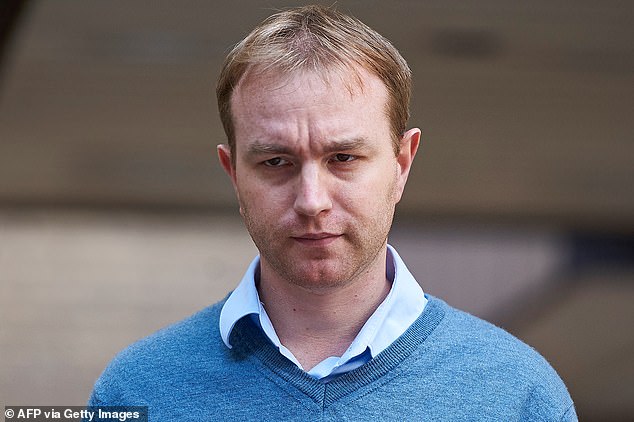Top-level fraud convictions in Britain are rare. The decision by the Supreme Court to overturn the verdict on former Citigroup and UBS trader Tom Hayes will not make the task any easier.
Hayes was involved in the manipulation of trades in the London Inter-Bank Offered Rate used in billions of transactions across the globe.
In the search for justice, when the scandal erupted in 2012, Hayes became the poster person for City wrongdoing.
He received a 14-year sentence after a jury trial (he served five-and-a-half years).
The Supreme Court reversal of the verdict, wildly celebrated by Hayes, was less about market abuse and more about over-zealous directions of the judge to the jury at the trial.
It has become fashionable to suggest that because many traders indulged in similar efforts to fix market outcomes, that what Hayes did was ordinary rather than exceptional.

Overturned: Former Citigroup and UBS trader Tom Hayes (pictured in 2015) has seen his conviction for fraud quashed by the Supreme Court
Cheating should never be acceptable. Market participants on the other side of the transaction will have lost out because of a lack of honesty and transparency.
The context of Hayes’ conviction and sentencing must be understood. The Serious Fraud Office (SFO) needed victories, having failed to bring anyone to justice during the Great Financial Crisis in 2008.
Taxpayer anger was running high and Hayes, by his own confession, was an easy target. Nothing could be pinned on more senior executives.
But in one of his best moments, the then Governor of the Bank of England, Mervyn King, summoned Barclays grandees to Threadneedle Street and demanded the head of chief executive Bob Diamond.
For as long as I can remember reviews into the judiciary have made the case against jury trials for fraud. It is argued that City malfeasance is too complex for ordinary mortals and some kind of tribunal system should be established.
This was first recommended by the Roskill Report in the 1980s, repeated by Lord Justice Auld in 2001 and endorsed again by Lord Leveson this month. All wanted to substitute financial experts sitting with a judge.
The target should not be the jury system. The real villains are overpaid City law firms and barristers who shut witnesses down by claiming ‘privilege’, long delays for white-collar cases and efforts to drown jurors in thousands of pages of incomprehensible testimony.
The SFO takes far too long to investigate and bring prosecutions, overcomplicates, and then claims the law is not fit for purpose.
Contrast Britain’s sclerotic justice with that in the US where bitcoin rascal Sam Bankman-Fried of FTX was indicted, tried and sentenced in just over a year. It was ever thus.
Instead of cheering Hayes’ triumph, we should bemoan the fact that the route to financial justice is so deeply flawed.
Wrong boot
Rachel Reeves’ purpose in seeking to remove the ‘boot on the neck’ of business by slashing red tape is to gee-up investment in British innovation.
One fears that taxes already imposed on wealth, abolition of non-domicile status, higher capital gains and inheritance tax levies already are driving the companies we want in Britain to cash out and scram.
Latest is fintech-forex group Alpha, which is accepting a £1.8billion bid from US competitor Corpay. The 55 per cent premium based on the share price in May appears generous.
It is less convincing when one considers the infamous ‘London discount’ to New York. Some recent tech bids achieved a whopping 96 per cent upside.
One might have hoped that chairman Jayne-Anne Gadhia, of Virgin Money fame, and Clive Kahn, chief executive of Travelex in its glory days, might have shown more resistance.
Pressure, however, to take the money and run is overwhelming.
Sinking sun
In the 1980s and 1990s the rising economic power of Japan and its investment in the US were seen as an enormous threat to US hegemony, as portrayed in Michael Crichton’s novel ‘Rising Sun’ and subsequent movie.
In Trump’s America it is very different. The price for lowering car tariffs is that Japan spends £405billion on inward investment in the US. How the world turns!
DIY INVESTING PLATFORMS

AJ Bell

AJ Bell
Easy investing and ready-made portfolios

Hargreaves Lansdown

Hargreaves Lansdown
Free fund dealing and investment ideas

interactive investor

interactive investor
Flat-fee investing from £4.99 per month

InvestEngine

InvestEngine
Account and trading fee-free ETF investing

Trading 212

Trading 212
Free share dealing and no account fee
Affiliate links: If you take out a product This is Money may earn a commission. These deals are chosen by our editorial team, as we think they are worth highlighting. This does not affect our editorial independence.












